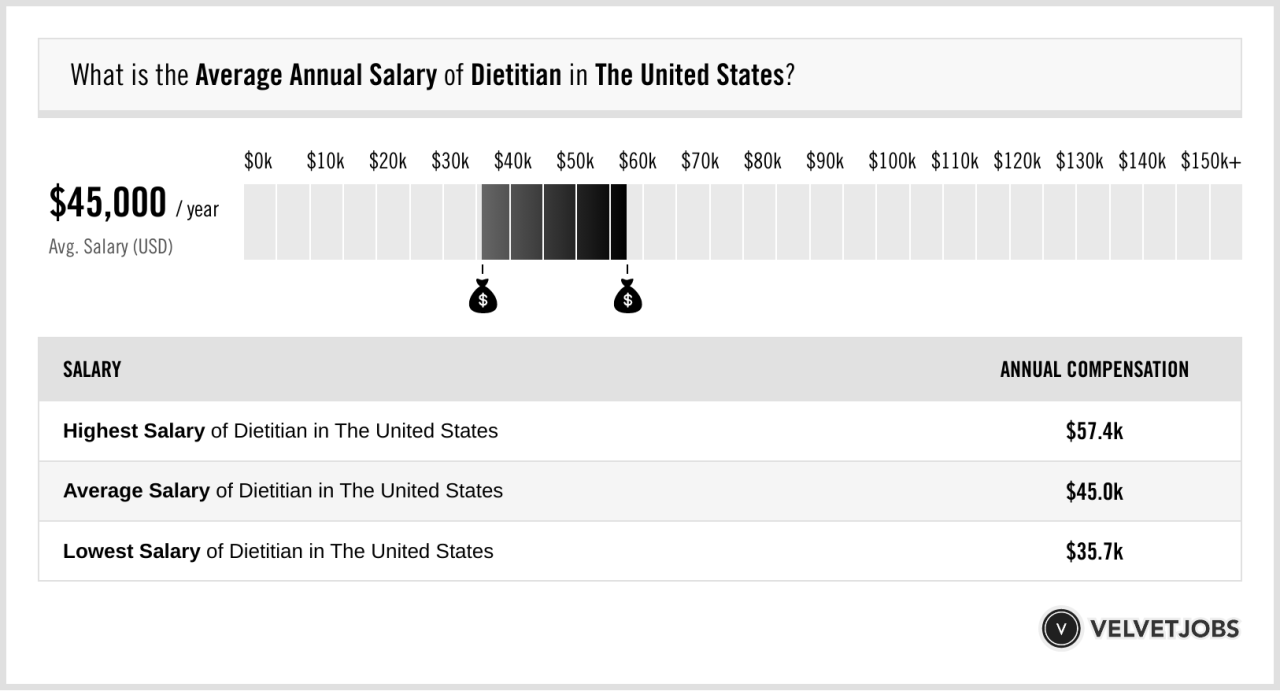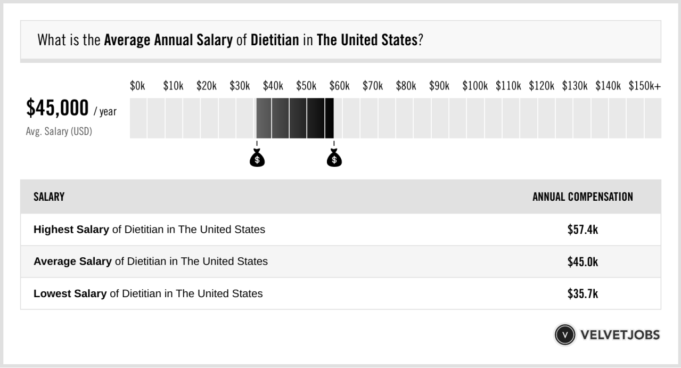How much do dietitians make? It’s a question that many aspiring nutrition professionals ponder. The answer, like a well-balanced meal, is multifaceted. It depends on factors like experience, location, education, and even the type of patients they serve.
Dietitians play a vital role in promoting health and wellness, working in diverse settings such as hospitals, clinics, schools, and private practices. They help individuals make informed food choices, manage chronic conditions, and optimize their overall health.
Dietitian Job Overview
Registered dietitians (RDs) are essential healthcare professionals who play a crucial role in promoting health and well-being through food and nutrition. They are experts in the science of food and nutrition, and they use their knowledge to help individuals and communities make informed food choices and achieve their health goals.
Dietitian Responsibilities
RDs are responsible for providing evidence-based nutrition counseling and education to individuals and groups. They assess nutritional needs, develop personalized meal plans, and monitor progress. They also work with healthcare providers to manage chronic diseases and promote overall health.
Work Settings for Dietitians
Dietitians work in a wide variety of settings, including:
- Hospitals:RDs in hospitals provide nutrition care to patients with various medical conditions, including those recovering from surgery, battling chronic diseases, or needing specialized diets.
- Clinics:Dietitians in clinics offer nutrition counseling to individuals with specific health concerns, such as weight management, diabetes, or heart disease. They may also work in community health centers or public health departments.
- Schools:School dietitians play a vital role in promoting healthy eating habits among students. They develop school lunch menus, educate students about nutrition, and work with families to address food allergies and other dietary needs.
- Private Practice:Some RDs choose to establish their own private practices, offering individual or group nutrition counseling to clients with a range of needs. They may specialize in areas such as weight loss, sports nutrition, or food allergies.
- Food Industry:Dietitians also work in the food industry, developing new products, conducting research, or providing nutritional information to consumers.
Common Tasks Performed by Dietitians
Dietitians perform a variety of tasks, including:
- Conducting nutrition assessments:This involves gathering information about a person’s dietary habits, medical history, and lifestyle to determine their nutritional needs and risks.
- Developing personalized meal plans:RDs create individualized meal plans based on the individual’s needs, preferences, and goals.
- Providing nutrition counseling:RDs offer guidance and support to help individuals make positive changes to their diets and lifestyle habits.
- Educating individuals and groups about nutrition:RDs teach others about the importance of healthy eating, food safety, and other nutrition-related topics.
- Monitoring progress and making adjustments:RDs regularly evaluate their clients’ progress and make adjustments to their meal plans or counseling strategies as needed.
- Collaborating with other healthcare professionals:RDs work closely with physicians, nurses, and other healthcare providers to ensure comprehensive care for their clients.
Factors Influencing Dietitian Salary
A dietitian’s salary is influenced by a variety of factors, including their experience, location, education level, and specialization. The more experience, education, and specialization a dietitian has, the higher their salary is likely to be. Location also plays a role, with dietitians in major cities typically earning more than those in rural areas.
Experience
Experience is a major factor influencing a dietitian’s salary. As dietitians gain more experience, they become more skilled and knowledgeable in their field. This increased expertise is reflected in their salaries. For example, a registered dietitian with 5 years of experience might earn a higher salary than a registered dietitian with only 1 year of experience.
Location
The location where a dietitian works can also significantly impact their salary. Dietitians in major metropolitan areas tend to earn higher salaries than those in smaller cities or rural areas. This is due to factors such as higher cost of living, greater demand for dietitians, and increased competition for jobs in these areas.
Education Level
The level of education a dietitian has also affects their salary. A dietitian with a master’s degree in nutrition or a related field will typically earn more than a dietitian with a bachelor’s degree. This is because a master’s degree often leads to more specialized knowledge and skills, which are in higher demand in the job market.
Specialization
Dietitians who specialize in a particular area of nutrition can often command higher salaries. Some common specializations include sports nutrition, pediatric nutrition, and geriatric nutrition. These specialized areas require additional training and expertise, which is reflected in the salary.
You might think dietitians are rolling in dough, but the truth is, their salaries are more like a sensible, balanced meal plan. Of course, they can help you find the best diet to lose belly fat , which is a great skill to have, but ultimately, they’re in it for the love of helping people eat well, not for the big bucks.
So, while they may not be raking it in, they’re definitely making a difference in people’s lives, one healthy choice at a time.
Certifications and Licensures
Certifications and licensures can also influence a dietitian’s salary. Obtaining a certification or license demonstrates a commitment to professional development and can make a dietitian more competitive in the job market. For example, becoming a Certified Specialist in Sports Dietetics (CSSD) or a Certified Diabetes Educator (CDE) can lead to higher earning potential.
Salary Ranges and Averages
The world of nutrition is a rewarding one, but how much can you expect to earn as a dietitian? Let’s dive into the numbers and see what the average salary looks like across the country.
National Median Salary
The median salary for dietitians in the United States is around $66,000 per year, according to the U.S. Bureau of Labor Statistics (BLS). This means that half of all dietitians earn more than this amount, and half earn less. However, keep in mind that this is just a national average, and salaries can vary significantly depending on factors such as location, experience, and specialization.
Salary Ranges by State or Region
The salary of a dietitian can vary significantly depending on the state or region where they work. For example, dietitians in California tend to earn higher salaries than those in other states, while those in the Midwest might see lower average salaries.
Here’s a breakdown of average dietitian salaries by state or region, based on data from the BLS:
| State/Region | Average Salary |
|---|---|
| California | $75,000 |
| New York | $70,000 |
| Texas | $65,000 |
| Midwest (Average) | $60,000 |
| Southeast (Average) | $55,000 |
Salary Ranges by Experience Level
Experience plays a major role in determining a dietitian’s salary. As you gain more experience, your knowledge and skills become more valuable, and you can command a higher salary.Here’s a table showing typical salary ranges for dietitians at different experience levels:
| Experience Level | Salary Range (Low) | Salary Range (High) | Average Salary |
|---|---|---|---|
| Entry-Level (0-2 years) | $50,000 | $60,000 | $55,000 |
| Mid-Level (3-5 years) | $60,000 | $75,000 | $67,500 |
| Senior Level (6+ years) | $75,000 | $90,000 | $82,500 |
Career Advancement and Salary Growth
A career as a dietitian offers opportunities for growth and advancement, leading to increased responsibilities, professional recognition, and, of course, higher salaries. This section explores the various paths dietitians can take to climb the career ladder and enhance their earning potential.
You’d think with all that knowledge about kale and quinoa, dietitians would be rolling in dough, right? Wrong! Turns out, their salaries are more “balanced” than a perfectly portioned meal. But hey, maybe if they knew how to use the right Keywords to market their services, they could be making bank! Who knows, maybe someday they’ll be earning enough to afford a personal chef…
to cook them a plate of kale and quinoa, of course.
Management and Leadership Roles
Dietitians with experience and expertise can progress into management and leadership roles. These positions involve overseeing teams of dietitians, managing budgets, and directing projects related to nutrition and wellness. Examples of such roles include:
- Director of Nutrition Services: Responsible for all aspects of nutritional care within a hospital, clinic, or other healthcare facility.
- Nutrition Manager: Oversees the daily operations of a nutrition department, including staffing, budgeting, and program development.
- Clinical Nutrition Manager: Leads the clinical nutrition team, providing guidance and supervision to registered dietitians working with patients.
These positions typically require advanced degrees, certifications, and significant experience in the field.
Professional Development and Advanced Education, How much do dietitians make
Continuous professional development is crucial for dietitians seeking career advancement and salary growth. Obtaining additional certifications and advanced degrees can enhance skills, expand knowledge, and open doors to higher-paying positions.
- Board Certification: Specializing in a particular area of dietetics, such as sports nutrition, pediatric nutrition, or geriatric nutrition, can lead to higher earning potential.
- Master’s Degree: A Master’s degree in Nutrition or a related field can qualify dietitians for leadership roles, research positions, and teaching opportunities.
- Doctorate Degree: A doctorate in Nutrition or a related field can lead to careers in academia, research, and policy-making.
Salary Increases Based on Years of Experience
Experience is a significant factor influencing a dietitian’s salary. As dietitians gain more experience, they typically command higher salaries due to their accumulated knowledge, skills, and expertise.
“Salaries for dietitians typically increase with experience. For example, a dietitian with 5 years of experience might earn an average salary of $60,000, while a dietitian with 10 years of experience might earn an average salary of $75,000.”
So you’re wondering how much dietitians make, huh? Well, let’s just say they’re not exactly rolling in dough, but they are experts on all things food. And speaking of food, did you know that a major factor in developing diabetes is a diet high in sugar and processed foods?
What causes diabetes is a complex question, but understanding it is crucial for maintaining good health. So, while dietitians might not be making a fortune, they are certainly making a difference in people’s lives by helping them make healthier choices.
While these are just estimates, they illustrate the general trend of salary growth based on experience.
Job Outlook and Demand: How Much Do Dietitians Make

The demand for dietitians is expected to grow significantly in the coming years, making it a promising career path for those interested in nutrition and health. This growth is driven by several factors, including the increasing focus on preventive healthcare and the rising prevalence of chronic diseases like diabetes and heart disease.
Factors Contributing to Demand
The demand for dietitians is influenced by several factors:
- Growing Focus on Preventive Healthcare:As people become more aware of the link between diet and health, they are increasingly seeking the guidance of dietitians to prevent chronic diseases. This trend is fueled by the increasing availability of information about nutrition and the growing awareness of the impact of diet on overall health.
- Rising Prevalence of Chronic Diseases:The increasing prevalence of chronic diseases like diabetes, heart disease, and obesity has led to a greater need for dietitians who can provide specialized care and support. Dietitians play a crucial role in managing these conditions through personalized nutrition plans and counseling.
- Aging Population:As the population ages, the demand for dietitians is expected to increase further. Older adults often have unique nutritional needs, and dietitians are well-equipped to address these needs and ensure optimal health.
- Increased Emphasis on Nutrition in Healthcare Settings:Hospitals, clinics, and other healthcare facilities are increasingly recognizing the importance of nutrition in patient care. This has led to an increased demand for dietitians who can provide nutrition counseling and support to patients.
Potential for Salary Increases
The increasing demand for dietitians is likely to drive salary increases in the coming years. As competition for qualified dietitians intensifies, employers will need to offer competitive salaries to attract and retain top talent.
“The demand for dietitians is expected to grow faster than the average for all occupations, resulting in more job opportunities for qualified professionals.”U.S. Bureau of Labor Statistics
For example, the median annual salary for registered dietitians in the United States was $61,670 in 2020. This figure is expected to rise as the demand for dietitians continues to grow.
Epilogue
So, how much do dietitians make? While the answer varies, the career path offers rewarding opportunities for growth and financial stability. With dedication and professional development, dietitians can build fulfilling careers that make a real difference in people’s lives.
Expert Answers
Do dietitians need a master’s degree?
While a bachelor’s degree is the minimum requirement, a master’s degree can open doors to higher-paying positions and specialized areas like research or teaching.
What are the best states for dietitians?
States with a high cost of living and a strong focus on health and wellness often offer higher salaries for dietitians. Research specific states and cities to find the best opportunities.
Are there any certifications that can increase my earning potential?
Yes, certifications like the Certified Nutrition Specialist (CNS) or the Board Certified Specialist in Sports Dietetics (CSSD) can demonstrate expertise and command higher salaries.
























